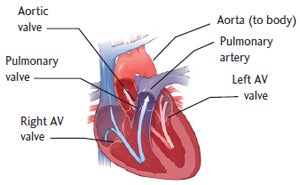Heart Valve Replacement
The primary treatment for valve problems is surgery. There are also procedural intervention options (to replace the valve without surgery) for select patients. The need and timing for procedural or surgical intervention depends on the person’s severity of symptoms and severity of the valve problem itself.
Today, heart valves (depending on those involved and the severeart ity of problem) can be repaired or replaced. When a heart valve must be replaced, heart surgeons can use a biological valve or a mechanical valve.
Age and lifestyle are important considerations for all patients facing heart valve surgery. Physicians like to do valve repairs as much as we can, but often replacement is necessary.
A mechanical heart valve can last a lifetime. However, the patient will also need to take blood-thinning medication (such as warfarin) for a lifetime. Patients who have mechanical valves run a greater risk of developing blood clots and stroke. Blood thinners significantly decrease this risk. Valve dysfunction is also prevented with the use of blood-thinning medication.
Patients who have biological valves do not need to take warfarin, but they may face another valve surgery in several years. Biological valves can last about 15 years and then must be replaced, which means another surgery.
Unless other health conditions point us in a clear direction, the choice of which type of valve to choose is ultimately up to the patient. Physicians can help them make the choice by looking at their lifestyles and experiences of other patients in their same age group.


A medically directed cardiac rehabilitation program, like the one available at WakeMed Healthworks, can patients return to their normal activity level through monitored exercise.
After valve surgery, patients also need to follow up with their cardiologist. Approximately four to six weeks after surgery, cardiologists perform an echo to establish a patient’s baseline heart and valve function. If everything is normal and there are no other problems, a repeat echo usually isn’t necessary for another three years. Patients who receive biological valves should have echocardiograms more frequently once they hit the five-year post-surgery mark to monitor the valve’s viability.
No matter what your age, if doing your normal activities leaves you short of breath or just feeling not quite right, see your doctor just to make sure all is fine.